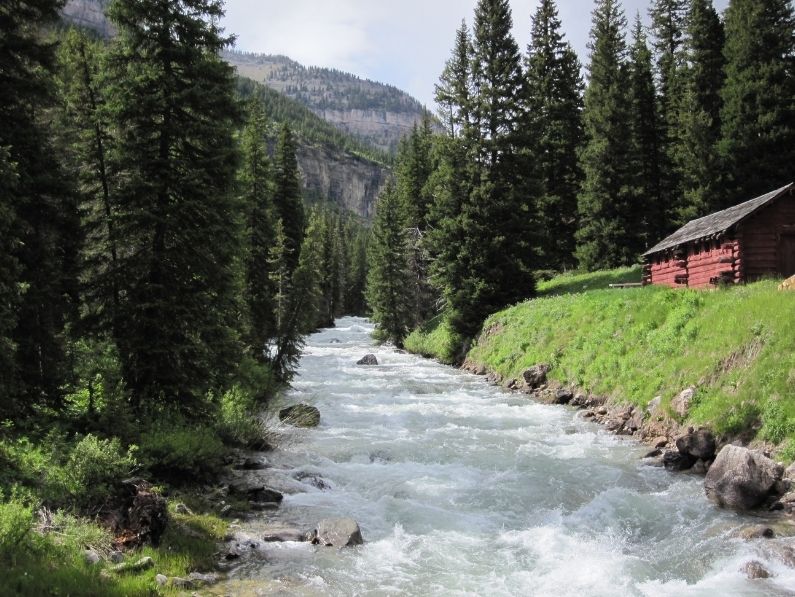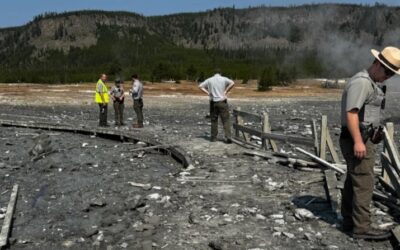Water quality has been in the news throughout 2020 and was a top issue for local candidates in this year’s election. In fact, the organization Protect Our Water Jackson Hole put every person running for County Commission, Town Council, and Mayor in front of the camera, and asked them to speak on how they would address water quality issues.
Just a few months later, a story broke that residents in the Hoback RV Park were facing eviction, mostly due to problems with their septic system. Residents have since seen their leases extended, but their sewage and drinking water issues are ongoing. It’s safe to say that water quality is now on the radar for Teton County residents and elected officials. The question is, what can they do about it?
“If we don’t take it more seriously, we’re going to see more Hobacks. That seems pretty clear,” said Luther Propst of the Board of County Commissioners.
Propst has personally made water quality a high priority during his tenure. Last Monday, he came into a commissioner’s meeting determined to learn more about what he’s up against. He wrote down several questions about what he and his colleagues can do moving forward to address water quality in Teton County.
“I’ve got nine different buckets of issues related to water quality,” Propst said. “And, you know, each of them involves different authorities between the Town and the County, or between the Conservation District and the County.”
Nine separate issues that fit into the general theme of water quality, including nitrate levels, potential E. coli contamination, and unregulated individual septic systems, to name a few. Hoback is just one area he hopes to address. And other electeds, nonprofits, and advocates have their own concerns. It’s clear that this is a mammoth issue that will take years to solve. The officials of today are paying for years of inaction from previous generations.
“I think it’s just kind of socially fallen through the cracks because it’s inconvenient to deal with,” Propst said. “It’s expensive to deal with, and we’ve been able to sweep it under the carpet.”
Local conservation groups say water quality has been neglected for the last 20 to 25 years. Now, ground can be made up, but it will take time, and there will be damages for folks in the meantime, according to Alan Rogers of the Wyoming Outdoor Council.
“There’s going to be a cost associated with this financially,” Rogers said. “And that could be borne by the community as a whole with support from the state and other sources. Or it could be borne by the poorest and most vulnerable people in the community who are upended from their homes because they don’t have clean water.”
Teton County is preparing to do short-term damage control at the same time as long-term planning in 2021. In a recent progress report on water quality, the county said they will be conducting various improvements this year regarding drinking water and sewage treatment, and that they have secured the funding to do so. Rogers hopes the county conducts more regular inspections and creates further regulations to at least try and catch issues before they get more expensive—and gross—than they should be. But because this is such a massive issue, some of this burden falls back to individuals advocating for this to remain a high priority, writing to electeds, and getting inspections on their own septic systems
“I mean, it’s not a very sexy issue,” Rogers said. “The immediacy isn’t there for people, even though, for every public water system that is contaminated, there needs to be millions and millions of dollars just to address that.”
There are 114 public water systems in Teton County, many of which lack regulations or source water protection plans. It’s just one more issue among Commissioner Propst’s nine within the overall bucket of water quality. And yet, this is still a topic being addressed on a fragmented level by different segments of government. Propst says that needs to change if we want these issues to be solved in a streamlined, and more comprehensive way.
“In the mid-year budget amendment, if the funding allows—and that’s a big underlying if—it’s a high priority to hire a person who is committed to improving and restoring our water quality,” Propst said. “Someone who works across all the different stovepipes, and across all the different cubicles.”
It’s clear that 2020 was the year to assess where we’re at with water quality and to think about what’s possible moving forward. It was also a year in which it was in the news, and on people’s minds, more than ever. The question is whether or not 2021 be the year in which significant, tangible action is made to reverse the trends that created situations like the one in Hoback Junction.





